Key takeaways:
- Understanding different types of web hosting (shared, VPS, dedicated, cloud) is crucial for selecting the right service based on needs, budget, and goals.
- Reliable web hosting enhances website performance, security, and accessibility, contributing to increased user trust and traffic.
- Key features to consider when choosing a hosting service include performance, scalability, and an intuitive control panel for easier site management.
- Optimizing web hosting involves leveraging features like caching, monitoring performance, and optimizing images to improve loading times and user experience.
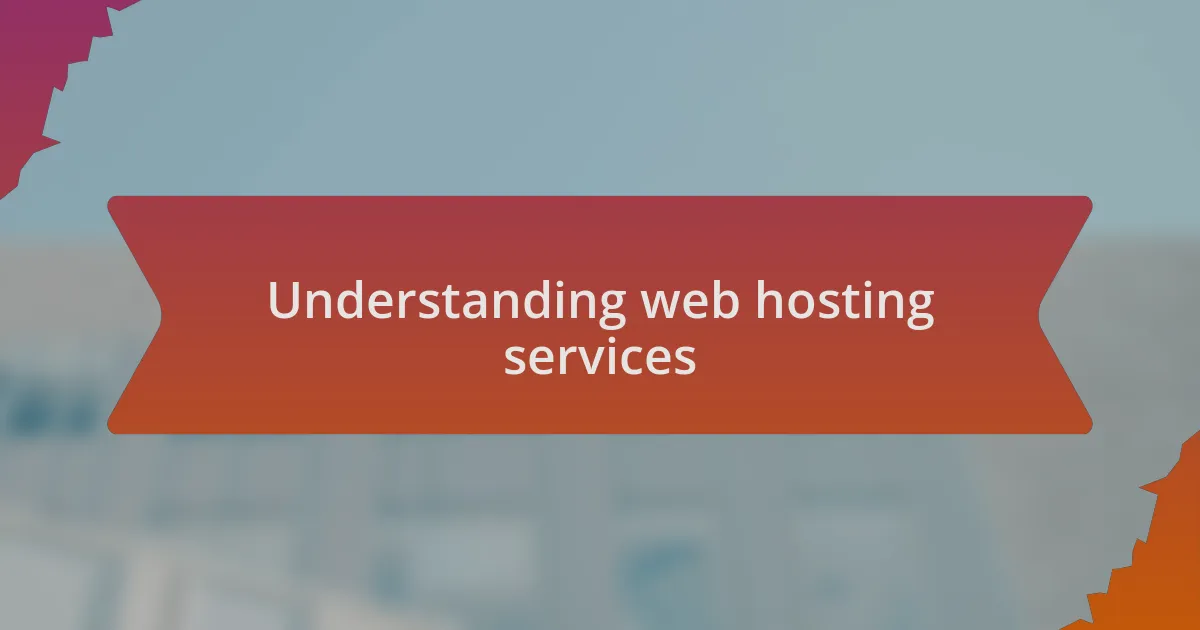
Understanding web hosting services
When I first started exploring web hosting services, I was overwhelmed by the variety of options available. It’s like walking into a vast tech store with endless aisles, each promising the perfect solution for your needs. Have you ever felt that way? I remember spending hours comparing features, pricing, and customer reviews, all while trying to figure out what might truly suit my project.
Understanding web hosting is crucial because it directly impacts your website’s performance. Think about it: if your site is slow or often crashes, users will simply go elsewhere. I still vividly recall the frustration I faced when my first website crashed during a peak traffic period. It felt like a professional meltdown unfolding in real time, and I couldn’t help but wish I had chosen a more reliable service.
The different types of hosting—shared, VPS, dedicated, and cloud—confused me at first, but each serves a unique purpose. Choosing the right type can feel like a daunting decision. I learned that shared hosting is budget-friendly, making it great for beginners, while dedicated hosting, although pricier, offers unmatched performance. It’s about finding the right balance based on your needs, goals, and budget. Have you assessed what matters most to you in a hosting service?
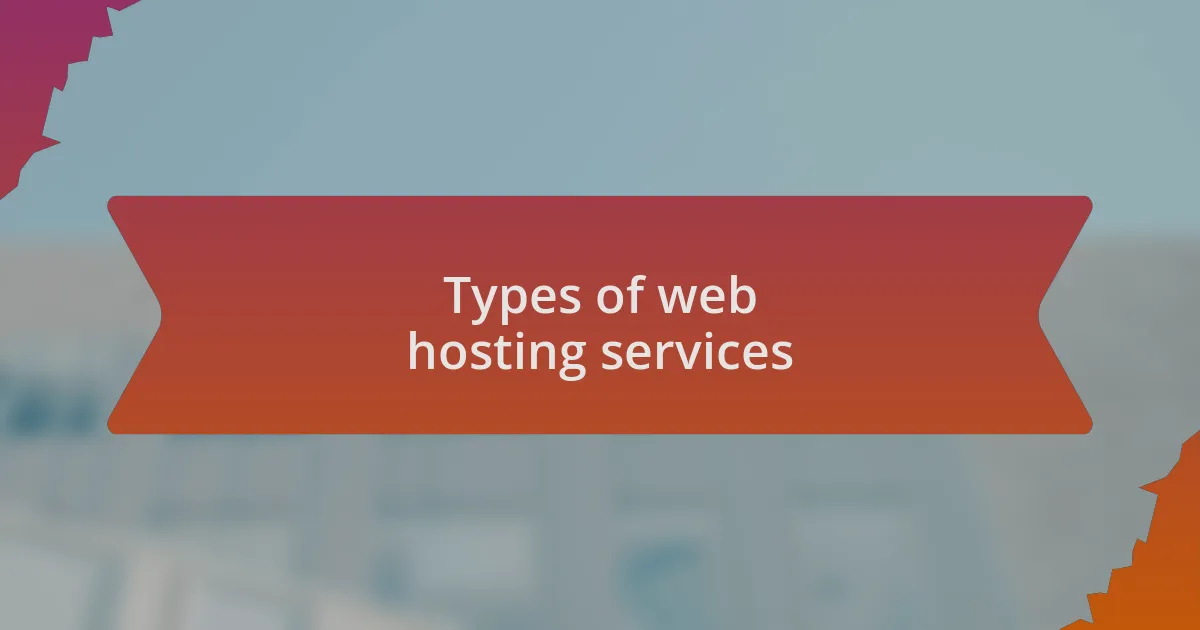
Types of web hosting services
When I first delved into shared hosting, I was pleasantly surprised by how economical it was. It felt like a cozy apartment in a bustling neighborhood—perfect for start-ups and small projects. However, I quickly learned that sharing resources means trusting your neighbors; if one site had a surge in traffic, it could impact my site’s performance. Have you considered how that might affect your online presence?
VPS hosting was a game-changer for me. The difference in performance was like upgrading from a bicycle to a sports car. With Virtual Private Servers, I finally gained dedicated resources, which meant faster load times and better stability. It felt empowering to have that level of control, but I can’t help but wonder if you’re ready to make that leap from shared hosting to VPS.
Then there’s dedicated hosting, which I experienced when my projects really took off. Transitioning to a dedicated server felt like moving into my own home with ample space and no interruptions. I was able to customize everything to fit my specific needs. But honestly, was it worth the higher cost for you? In my case, the reliability and performance boost were invaluable, though it’s essential to evaluate if that investment aligns with your aspirations.
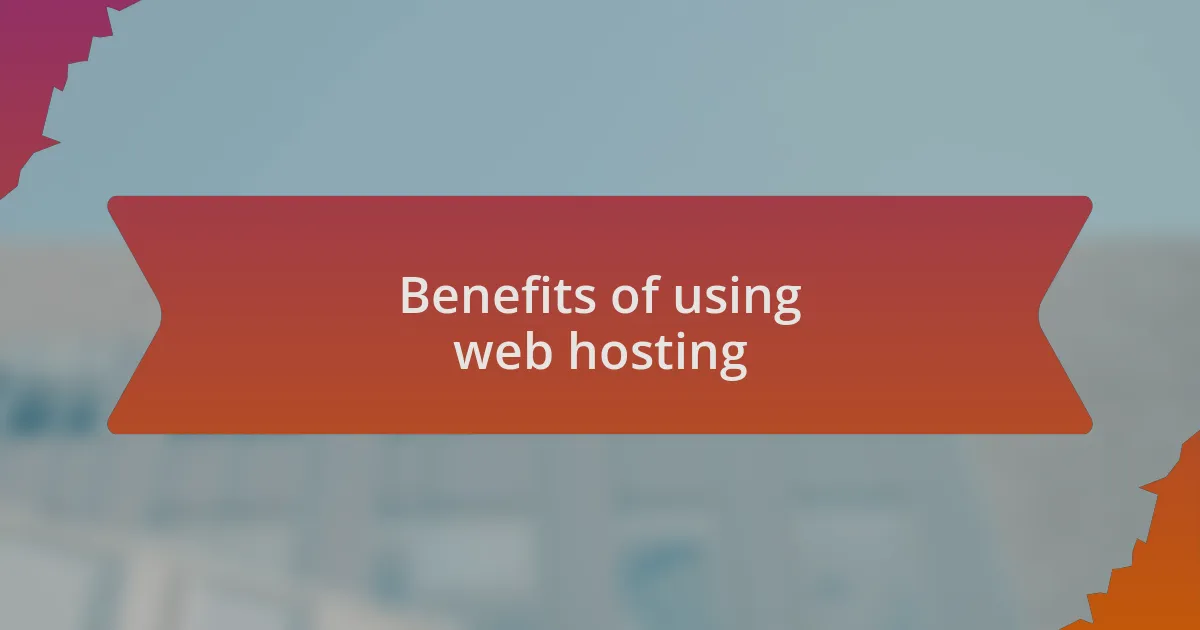
Benefits of using web hosting
Using web hosting services can significantly enhance the online visibility of your website. When I first launched my blog, having reliable hosting meant that my site was accessible 24/7, allowing readers from different time zones to connect with my content. Isn’t it reassuring to know that your hard work will always be available to others, regardless of when they choose to visit?
One of the standout benefits for me has been the robust security features that come with many web hosting plans. I remember feeling a wave of relief when I discovered that my hosting service included SSL certificates and regular backups. These features gave me peace of mind, knowing my data—and that of my visitors—was protected. Have you considered how essential that level of security is to building trust with your audience?
Moreover, customer support can be a lifesaver, especially when you encounter technical issues. I had my fair share of moments when things went wrong, and having a responsive support team at my fingertips made a world of difference. It felt like having a trusty friend to call when facing a tech crisis. Have you thought about how vital reliable support can be when you’re navigating the complexities of managing a website?

Key features to consider
When choosing a web hosting service, performance and speed are crucial features to consider. I remember the frustration I faced when my first website loaded slowly—visitors would leave before it even fully appeared. It’s baffling how just a few seconds can make or break user engagement. Have you ever waited for a site to load and felt that familiar disappointment?
Another key feature that I often weigh is scalability. At first, I didn’t think my blog would grow much, but now it’s expanded beyond my expectations. Having a host that allows you to upgrade plans easily without a hitch can save you from a lot of headaches down the road. Isn’t it nice to know that as your online presence grows, your hosting can keep pace?
Lastly, I can’t stress enough the importance of easy-to-use control panels. My initial host had a complicated interface that almost deterred me from diving into site management. When I switched to a provider with a more intuitive setup, it felt like I had been given a roadmap. How much simpler would your life be if managing your site was less of a chore?
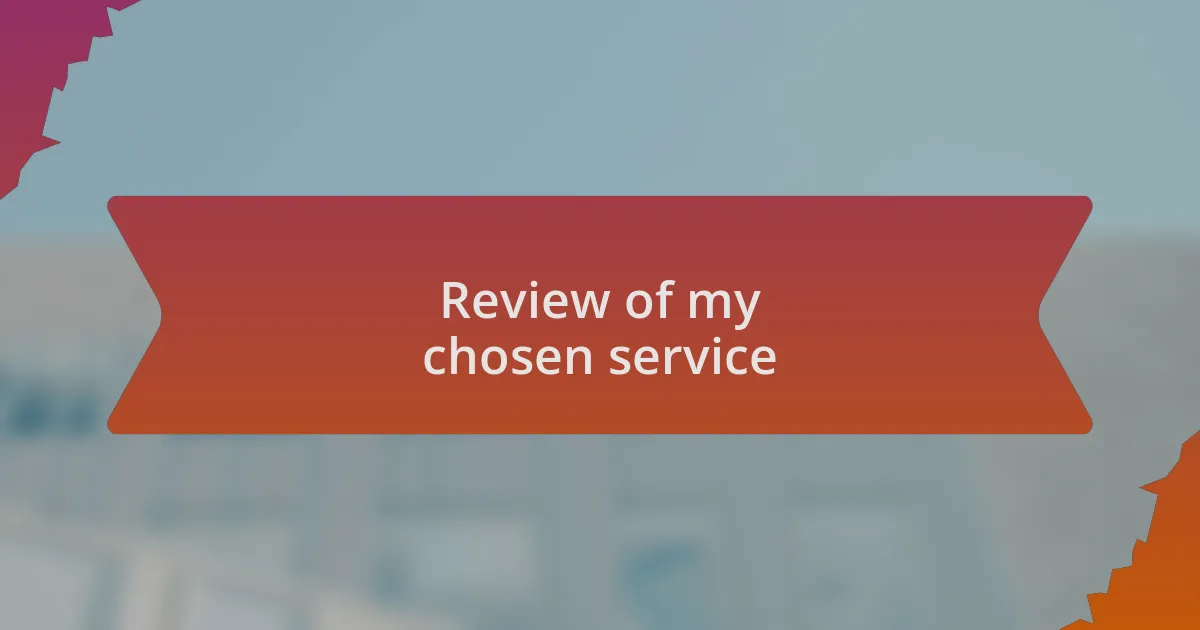
Review of my chosen service
When I decided to go with my current web hosting service, I was drawn to their commitment to uptime reliability. I recall a time when my former hosting provider experienced frequent outages, leaving my site inaccessible to visitors. That instability impacted my credibility, and switching to a service that consistently delivers high uptime significantly eased my worries. Have you ever wondered how downtime can affect your business?
Another standout feature of my chosen service is their customer support. I’ve had late-night technical issues, and I always appreciate their 24/7 availability. It gives me peace of mind knowing that no matter when a problem arises, expert help is just a chat or call away. Can you imagine being stuck at midnight, unwilling to have your site down until morning?
Along with reliable customer service, I also appreciate the affordability of my hosting plan. I remember being hesitant initially, as many quality services seemed pricey. However, my current provider has struck the perfect balance between cost and features, making it a win-win for my budget and my website’s performance. What if, instead of breaking the bank, you found a service that delivered on all fronts without a hefty price tag?
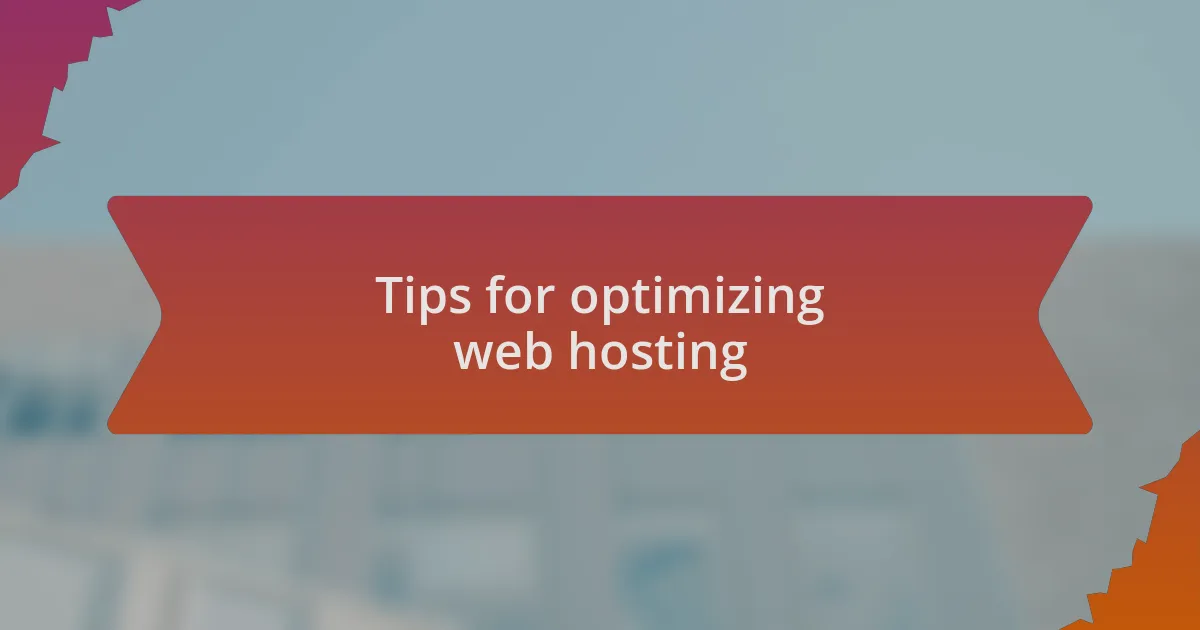
Tips for optimizing web hosting
Optimizing web hosting isn’t just about choosing the right provider; it’s also about making the most of the features they offer. For instance, I learned early on the importance of leveraging caching to speed up my website. Implementing caching plugins saved me from endless loading times, and the boost in site performance was noticeable. Have you ever felt that frustration while waiting for a page to load?
Another tip I found valuable is regularly monitoring website performance. I started using monitoring tools to keep track of my site’s speed and downtime. This proactive approach not only helped me identify potential issues early but also kept me connected with my audience by ensuring they always had access to my content. Can you imagine responding to visitors before they even encounter problems on your site?
Finally, I can’t stress enough the importance of optimizing images. Initially, I overlooked this aspect, loading high-resolution images that significantly slowed down my webpages. Once I began compressing and resizing images, the difference was remarkable. Pages loaded faster, and my site’s user experience improved significantly. Isn’t it rewarding to see immediate results from simple changes?